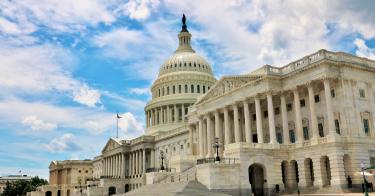“There are men, in all ages, who mean to exercise power usefully, but who mean to exercise it. They mean to govern well, but they mean to govern. They promise to be kind masters, but they mean to be masters.” This is the wisdom of Daniel Webster, who served in both the Senate and House of Representatives and as secretary of state under three presidents. Today, 174 years later, Senate Democrats are demonstrating just what Webster meant.
Just look at the record. On Jan. 5, 1995, the Senate voted 76-19 to table a proposal by Democratic Sen. Tom Harkin to eliminate the filibuster after three attempts to end debate on a bill. Current senators, including Democrats Dianne Feinstein of California and Patty Murray of Washington, as well as then-Sen. Joe Biden, voted to table it.
In 2005, some Republicans talked about eliminating the filibuster, which Democrats had begun using to defeat judicial nominations even though the nominees had majority support. Sens. Biden, Chuck Schumer, and Barack Obama were among the loudest protesters, defending extended debate as the very heart of the Senate as an institution.
Biden explained that America’s founders designed the Senate to be “a different kind of legislative body” than those in which even a slim majority has all the power. Abandoning this critical part of the “system of checks and balances,” he said, would “eviscerate the Senate.” Biden also stressed that “Even when the Senate’s rules have been changed in the past to limit extended debate, it has been done with great care, remarkable hesitancy, and by virtual consensus.”
>>> Fact Check: Biden & Harris’ Lies About Elections, Voting Rights, Filibuster
Schumer called extended debate the “guard rail of our democracy” and argued that by making it harder to ignore the minority, extended debate “often makes better legislation.” Schumer denounced any effort to undermine extended debate as a “power grab” that would destroy the “checks and balances that are at the core of our Constitution and our Republic.” Doing so, he said, would be “a recipe for more conflict and bad blood between the parties” and “would turn the U.S. Senate into a legislative wasteland and turn the Constitution inside out.”
Obama agreed, warning that “if the majority chooses to … change the rules and put an end to democratic debate, then the fighting, the bitterness, and the gridlock will only get worse.”
On Jan. 27, 2011, the Senate voted 12-84 against the Harkin proposal. Twenty current Democrats, including Majority Leader Chuck Schumer, opposed it. Nearly three-quarters of current Democrats were serving on Jan. 24, 2013, when the Senate again rejected the Harkin proposal, this time by voice vote. And less than five years ago, in April 2017, 26 current Democrats and then-Sen. Kamala Harris signed a letter “opposing any effort to curtail the existing rights and prerogatives of Senators to engage in … extended debate on legislation.”
These Democrats made another point that is especially important today. Biden says today that he supports eliminating extended debate only for a particular bill, not across the board. Anyone who believes that it will stop there might want to look into oceanfront property in Iowa. Biden himself rejected that idea back in 2005, arguing that eviscerating the Senate by terminating extended debate “to help in one political fight or another … would be disastrous.” He quoted historian Robert Caro, author of Master of the Senate, saying that extended debate is not about “the particular dispute of the moment, but … the fundamental character of the Senate.”
When they designed our system of limited government, America’s founders were aware of another truth—that “unlimited power is apt to corrupt the minds of those who possess it.” So said William Pitt, the first earl of Chatham and prime minister of Great Britain in the late 1760s. Biden had the prescription for avoiding this end when he said in 2005 that a “current debate, over a particular set of issues, should not be permitted to destroy what history has bestowed on us.”
This piece originally appeared in the Washington Examiner



